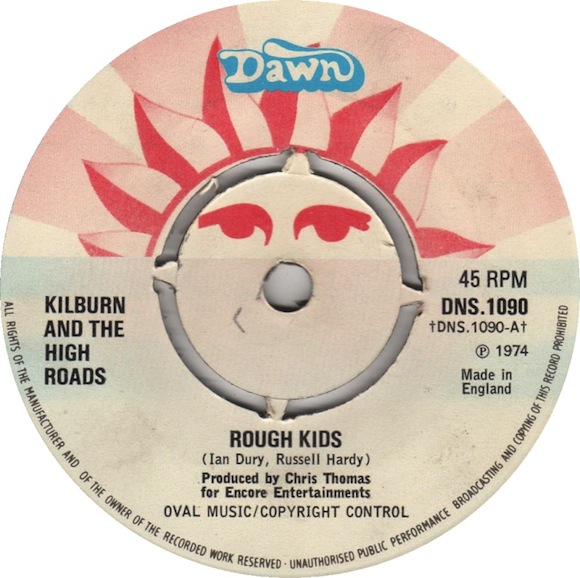Rough Kids badge for Kilburn And The High Road (sic)
As an addendum to my recent post about the staging of the very special late night London concert given by Ian Dury’s art-rock ensemble Kilburn & The High Roads in 1974, here’s the badge commissioned by manager the late Tommy Roberts to flag up the concurrent release of the group’s single Rough Kids.
Then a neglected pop promotional medium – badges were considered kids’ stuff; the sole prominent champion was Barney Bubbles, who produced a range to go with his branding of space rockers Hawkwind and pub-rock outfit Chilli Willi And The Red Hot Peppers – the pre-punk barbed wire logo button was conceived and executed by Simon Haynes, designer of the ambitious stage set for the Kilburns’ gig at the King’s Road Theatre.
“We ordered the badges to be made in a place way out in the East End run by a little old lady,” recalls Haynes. “Tommy was furious when he saw them. She thought they were part of an initiative warning pedestrians to avoid Kilburn High Road, so knocked the final ‘s’ off in the belief that we had misspelt it. There was a lot of effing and blinding that day.”
The single version of Rough Kids starts with gravel-voiced dialogue between Roberts and Dury:
“Oi, Ian, what’s going on over there?”
“I dunno, I think there’s a bit of trouble…”
//The dialogue was excised from the version on the Kilburns album Handsome//
Rough Kids failed to chart, though its street edge provided inspiration for the members of what would become the Sex Pistols, then rehearsing together in various formulations. They had not yet started to fully work with Malcolm McLaren, who supplied Dury and others with stagewear from his shops Let It Rock and Sex, and left for his New York sojourn with the New York Dolls around the time of the single’s release.
In 2009, McLaren told Dury’s biographer Will Birch that he first encountered the Kilburns “reading through the small ads in the back of the music rags every week, NME, Melody Maker, primarily for the purpose of generally looking for pop cultural events that might in some way interest me. I was trawling the ruins of a past pop culture and the idea of calling yourself Kilburn &The High Roads, after the name of a street, intrigued me.
“That had been going on for decades; the doo-wop groups in the 1950s in the US were often named after their local pizzeria, community centre, football team or street corner. This was the first time I’d heard of someone in the UK and specifically London do this, so it pricked my interest. I think I saw it as a little ad, one those promoters would put in the music weeklies.
“They came like a kind of gang into my store and I had made the most beautiful suits for them. At that moment I was fascinated by the wide-shouldered spiv suits worn just after the war when kids controlled the streets and almost the black market economy of London, so I struck up a relationship because that history intrigued other art-school graduates like (one-time Kilburns bass-player) Humphrey Ocean, Ian Dury and Tommy Roberts.”
McLaren took photographer Roberta Bayley – then working as an assistant in Let It Rock and later to have a relationship with Dury – to witness the Kilburns in action: “They were they doing covers by people like Alma Cogan and were very interested in detailing the minutiae of the era they coveted, a kind of golden age which none of us could bring back, but that’s where you sought your inspiration.
“The art school thing really made us very close, but we didn’t truthfully know each other. I was in a different world. My mission was heading towards something else but I didn’t know what it was at the time, until years later when it was labelled Punk. At the time I couldn’t tell you what I was looking for but I certainly wasn’t looking to remain in that nostalgic vein.”
As Roberts told me while we were working on his biography Mr Freedom: “Rough Kids was a marvellous record, but before it’s time. With the Kilburns I was a little bit off on my timing, just a bit too early, maybe six months. Pub rock was OK but Ian had that little bit extra.”
Ian Dury: The Definitive Biography is a recommended read and is available to order here.



